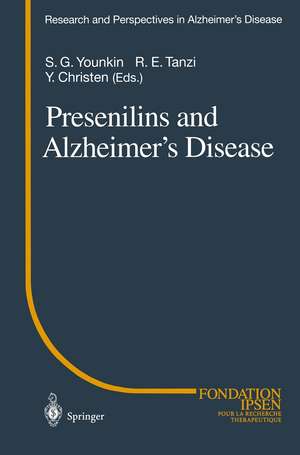Presenilins and Alzheimer’s Disease: Research and Perspectives in Alzheimer's Disease
Editat de Steven G. Younkin, Rudolph E. Tanzien Limba Engleză Paperback – 29 feb 2012
Din seria Research and Perspectives in Alzheimer's Disease
- 18%
 Preț: 943.57 lei
Preț: 943.57 lei - 18%
 Preț: 1833.48 lei
Preț: 1833.48 lei - 18%
 Preț: 943.73 lei
Preț: 943.73 lei - 5%
 Preț: 1094.80 lei
Preț: 1094.80 lei - 18%
 Preț: 957.13 lei
Preț: 957.13 lei - 24%
 Preț: 1035.49 lei
Preț: 1035.49 lei - 18%
 Preț: 941.82 lei
Preț: 941.82 lei - 18%
 Preț: 1216.48 lei
Preț: 1216.48 lei - 18%
 Preț: 1211.74 lei
Preț: 1211.74 lei - 18%
 Preț: 937.58 lei
Preț: 937.58 lei - 5%
 Preț: 707.33 lei
Preț: 707.33 lei - 5%
 Preț: 716.09 lei
Preț: 716.09 lei - 5%
 Preț: 711.32 lei
Preț: 711.32 lei - 15%
 Preț: 636.30 lei
Preț: 636.30 lei - 5%
 Preț: 707.86 lei
Preț: 707.86 lei - 5%
 Preț: 712.60 lei
Preț: 712.60 lei - 5%
 Preț: 711.52 lei
Preț: 711.52 lei - 5%
 Preț: 712.25 lei
Preț: 712.25 lei - 5%
 Preț: 707.50 lei
Preț: 707.50 lei - 15%
 Preț: 639.08 lei
Preț: 639.08 lei - 18%
 Preț: 938.51 lei
Preț: 938.51 lei - 5%
 Preț: 365.99 lei
Preț: 365.99 lei - 15%
 Preț: 636.30 lei
Preț: 636.30 lei - 5%
 Preț: 367.84 lei
Preț: 367.84 lei - 15%
 Preț: 635.80 lei
Preț: 635.80 lei - 18%
 Preț: 1211.90 lei
Preț: 1211.90 lei
Preț: 631.86 lei
Preț vechi: 743.37 lei
-15% Nou
Puncte Express: 948
Preț estimativ în valută:
120.94€ • 131.42$ • 101.66£
120.94€ • 131.42$ • 101.66£
Carte tipărită la comandă
Livrare economică 21 aprilie-05 mai
Preluare comenzi: 021 569.72.76
Specificații
ISBN-13: 9783642721052
ISBN-10: 3642721052
Pagini: 120
Ilustrații: XVI, 100 p. 10 illus., 5 illus. in color.
Dimensiuni: 155 x 235 x 6 mm
Greutate: 0.18 kg
Ediția:Softcover reprint of the original 1st ed. 1998
Editura: Springer Berlin, Heidelberg
Colecția Springer
Seria Research and Perspectives in Alzheimer's Disease
Locul publicării:Berlin, Heidelberg, Germany
ISBN-10: 3642721052
Pagini: 120
Ilustrații: XVI, 100 p. 10 illus., 5 illus. in color.
Dimensiuni: 155 x 235 x 6 mm
Greutate: 0.18 kg
Ediția:Softcover reprint of the original 1st ed. 1998
Editura: Springer Berlin, Heidelberg
Colecția Springer
Seria Research and Perspectives in Alzheimer's Disease
Locul publicării:Berlin, Heidelberg, Germany
Public țintă
ResearchCuprins
Molecular Genetics of the Presenilins in Alzheimer’s Disease.- Alzheimer’s Disease: A Matter of Dominance.- Alternative Endoproteolysis of the Presenilins and Familial Alzheimer’s Disease.- The APP and PS1/2 Mutations Linked to Early Onset Familial Alzheimer’s Disease Increase the Extracellular Concentration of A?1-42(43).- Metabolism and Function of Presenilin 1.- Mechanistic Studies of the Effect of Presenilins 1 and 2 on APP Metabolism.- Presenilin 2 — APP Interactions.- The Cellular Biology of Presenilin Proteins and a Novel Mechanism of Amyloid ?-Peptide Generation.- Regulation of Presenilin 1 Phosphorylation and Transcriptional Activation of Signal Transduction-Induced Genes by Muscarinic Receptors.- Neuronal Regulation of Presenilin-1 Processing.- Transgenic Approaches to the Study of Alzheimer’s Disease.
Textul de pe ultima copertă
The discovery in 1995 that defects in the novel presenilin genes harbor defects which cause up to half of all cases of early onset familial Alzheimer's disease cases has rapidly led to the creation of a new and exciting sub-field in Alzheimer's disease research. This has clearly been evidenced by the fact that over 250 papers have now been published regarding the presenilins since their identification in 1995. One of the earliest findings regarding the role of the presenilins in Alzheimer's disease was the discovery that like familial Alzheimer's disease mutations in the amyloid ß protein precursor gene, those in the presenilins lead to dramatically increased production of ß-amyloid in the brains of AD patients. Additionally, the presenilins appear to play roles in programmed cell death (apoptosis) and in CNS development. The provocative chapters in this book written by some of the most highly respected experts in the area of Alzheimer's disease research present some of the latest information concerning the biological function of the presenilins and how defects in these genes cause Alzheimer's disease. The knowledge contained in this volume should help to accelerate ongoing attempts to develop novel treatments for Alzheimer's disease and related disorders.











